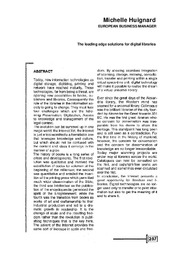| dc.contributor.author | Huignard, Michelle | en |
| dc.coverage.spatial | GR - Ρόδος | en |
| dc.date.available | 2005-10-13T12:00:00Z | el_GR |
| dc.date.issued | 1999 | el_GR |
| dc.identifier.uri | http://hdl.handle.net/10797/11978 | en |
| dc.description | Περιέχει το πλήρες κείμενο | el_GR |
| dc.description.abstract | Today, new information technologies as digital storage, digitizing, printing and network have reached maturity. These technologies, far from being a threat, are opening new possibilities to books, publishers and libraries. Consequently the role of the libraries in the information society is going to change. They must face four challenges which are the folio-wing: Preservation, Digitization, Access to knowledge and Management of the legal context. The evolution can be summed up in one magic world, the Internet. Yet, the Internet is just a tool-admittedly a formidable one that leverages knowledge and culture, but which should not be confused with the content and ideas it conveys in the manner of a pipe. The history of books is a long series of crises and developments. The first revolution was qualitative and involved the substitution of codex for volumen at the beginning of the millenium; the second was quantitative and entailed the invention of the printing press which permitted much wider dissemination of the Bible; the third was intellectual as the publication of the encyclopaedia generated the spirit of the Enlightenment; while the fourth was the transition from books as works of art and craftsmanship to their industrial production and led to a dramatic growth in readership. It is the change of scale and the resulting freedom rather than the revolution in publishing techniques that is the key here. The advent of the Internet provides the same sort of increase in scale and free dom. By allowing seamless integration of scanning, storage, indexing, consultation, transfer and printing within a single virtual space-time unit, digital technology will make it possible to realise the dream of a virtual universal library. Ever since the great days of the Alexandria library, the Western mind has yearned for a universal library, Callimaque was the brilliant librarian of the city founded by Alexander the Great towards 331 BC. He was the first great librarian whose concern for conservation was inseparable from his desire to share this heritage. This standpoint has long been and is still seen as a contradiction. For the first time in the history of mankind, however, the concern for conservation and the concern for dissemination of knowledge are no longer irreconcilable. Today major scanning projects are under way at libraries across the world. Catalogues can now be consulted on the Net, and copyright-free works are scanned and sometimes even circulated over the Net. In conclusion, the Internet presents a great opportunity for literature and libraries. Digital technologies are no longer used only to transfer or to print information but also to get the meaning of it and to share it | en |
| dc.language.iso | eng | en |
| dc.publisher | Βιβλιοθήκη Πανεπιστημίου Αιγαίου | el_GR |
| dc.relation.ispartof | Καινοτομίες, υποδειγματικές εφαρμογές, νέες τάσεις. | el_GR |
| dc.source | Η Ακαδημαϊκή Βιβλιοθήκη ως εκπαιδευτική και ερευνητική μονάδα στην 3η χιλιετία - 8ο Πανελλήνιο Συνέδριο Ακαδημαϊκών Βιβλιοθηκών | el_GR |
| dc.source.uri | http://abekt.lib.ucy.ac.cy/synedria/8psab/8psab029.pdf | en |
| dc.title | The leading edge solutions for digital libraries | en |
| dc.type | Conference Object | en |
| dc.subject.JITA | Βιβλιοθήκες ως φυσικές συλλογές | el_GR |
| dc.subject.JITA | Libraries as physical collections | en |
| dc.contributor.conferenceorganizer | Πανελλήνιο Συνέδριο Ακαδημαϊκών Βιβλιοθηκών | el_GR |
| dc.identifier.JITA | DZ | en |
